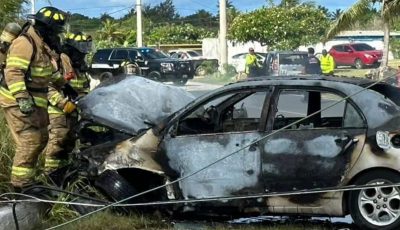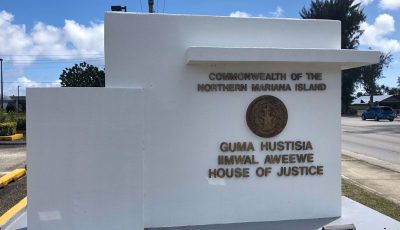Justices reverse Crisostomo’s conviction on ‘ice’ possession
The CNMI Supreme Court has found unlawful the police officers’ early morning stop of a vehicle that almost collided with their police cruiser in a beach “known as an area for drug users” and vacated the conviction of one of the car’s two passengers, Joseph A. Crisostomo, on a count of illegal possession of methamphetamine or “ice.”
Police did not have reasonable suspicion to make the initial stop and therefore the evidence gained during the stop is suppressed, said the high court’s opinion penned Friday by Associate Justice Perry B. Inos and concurred by Chief Justice Alexandro C. Castro and Associate Justice John A. Manglona.
In vacating Crisostomo’s conviction, the justices ruled that it was an error to label the beach as a high-crime area solely on generalized assertions that an area is well-known for certain illegal activities.
The justices said that because the totality of the circumstances did not give the officers reasonable suspicion of a felony or a traffic-code infraction, they reverse Superior Court Associate Judge David A. Wiseman’s order denying Crisostomo’s motion to suppress evidence.
“Under the exclusionary rule, evidence obtained by police through unlawful means usually must be suppressed,” said the justices, citing precedent.
Last February, Crisostomo was convicted of possession of “ice” and criminal contempt. Associate Judge Joseph N. Camacho sentenced him to the maximum of five years and six months in prison without the possibility of parole.
Crisostomo, through assistant public defender Michael A. Sato, appealed to the CNMI Supreme Court.
The issue that Sato presented on the appeal was whether Judge Wiseman erred in finding reasonable suspicion for a traffic stop, when the police officers initiated the stop without any objective reasons for suspecting wrongdoing. The officers detained and conducted a search on Crisostomo, which Sato said was a violation of his client’s Fourth Amendment right.
The other issue that Sato presented was whether the Superior Court erred by admitting the evidence recovered as a result of the search on Crisostomo, when that evidence was obtained from an unlawful search that violated the defendant’s Fourth Amendment right to be free from unreasonable searches and seizures.
The case arose from an incident on Jan. 11, 2012, at 3:17am, when police officers Tyrone Teregeyo and T.J. Yangetmai did a routine check at a secluded beach in Susupe, Saipan. The area is routinely checked by the police because it is known for drug related crime. As the officers turned into the dirt road aboard a marked police vehicle, a Toyota Tercel car that was parked in the middle of the one-lane road turned on its engine and headlights.
The car sped directly toward the officers’ vehicle, almost causing a head-on collision. The officers searched the backseat of the car and found a glass tube suspected to be drug paraphernalia.
Crisostomo, who was a passenger, and his companion were arrested for possession of less than a gram of “ice.” Crisostomo’s companion entered a guilty plea.
Sato argued, among other things, that the trial court erred by finding suspicion for the traffic stop because the police officer was unable to articulate objective reasons that meet a totality of the circumstances test to establish reasonable suspicion of legal wrongdoing to justify the officer’s decision to initiate the stop of Crisostomo’s vehicle.
Then-assistant attorney general Margo Brown-Badawy said the high court should uphold Crisostomo’s conviction. She said the officers had multiple reasons to develop a reasonable suspicion of criminal activity as Crisostomo was in a place believed to be a high-crime area at a highly unusual time.
Brown-Badawy asserted, among other things, that upon conducting an investigatory detention, officers saw drug paraphernalia in plain view.
In their opinion, the justices said there was insufficient evidence to support a finding that the beach was a high-crime area.
The justices said the officers never provided the court the data necessary to independently review whether the beach was, in fact, a high-crime area.
The justices said the police lacked reasonable suspicion of either a traffic-code violation because the evidence does not support that the car was driving at an imprudent speed.
The justices noted that the area was too small and rugged to build up a high rate of speed.
“What’s left is that Crisostomo was at the beach at a late hour—but being out and about late at night is not enough to create reasonable suspicion,” the justices said.
Crisostomo is currently serving life imprisonment for kidnapping, raping, killing, and robbing bartender Emerita R. Romero. He is also appealing his conviction in that case.


























